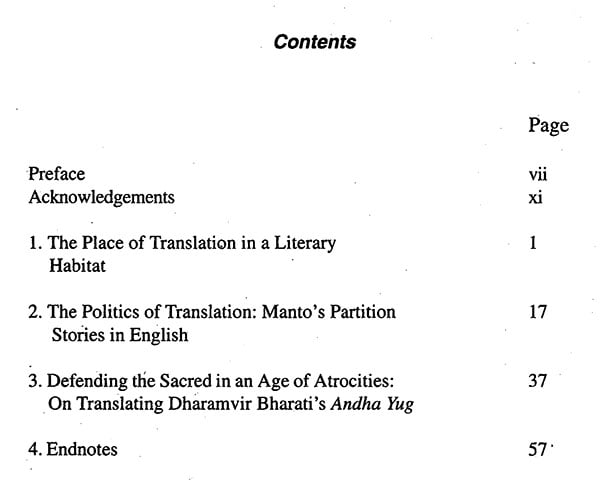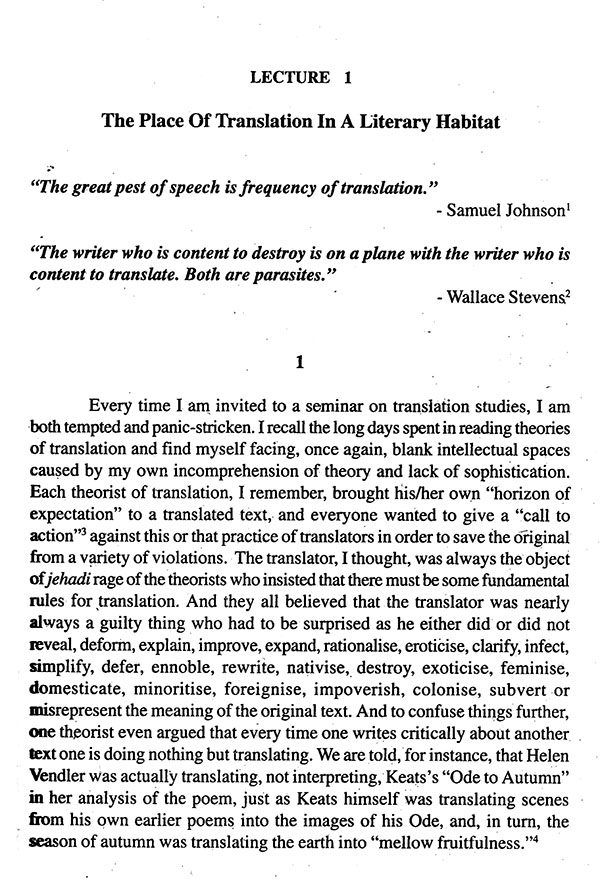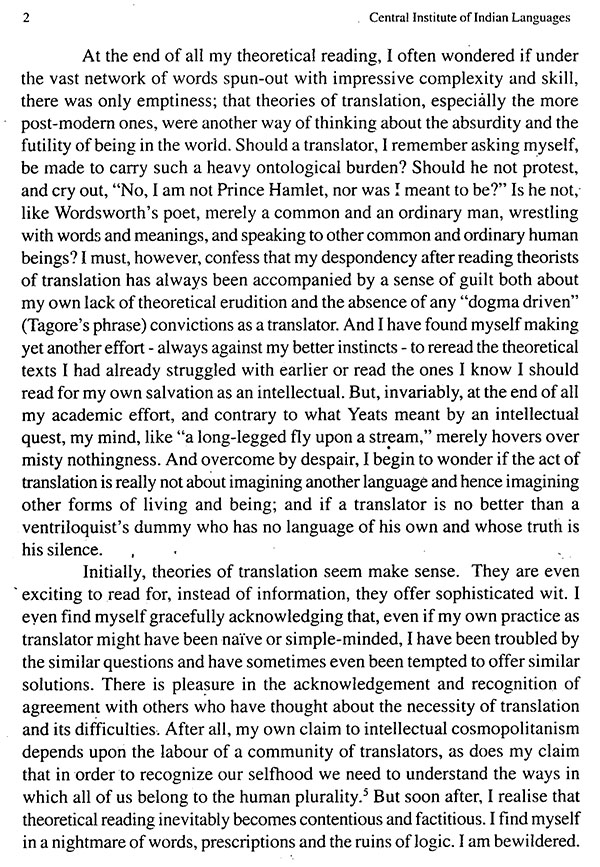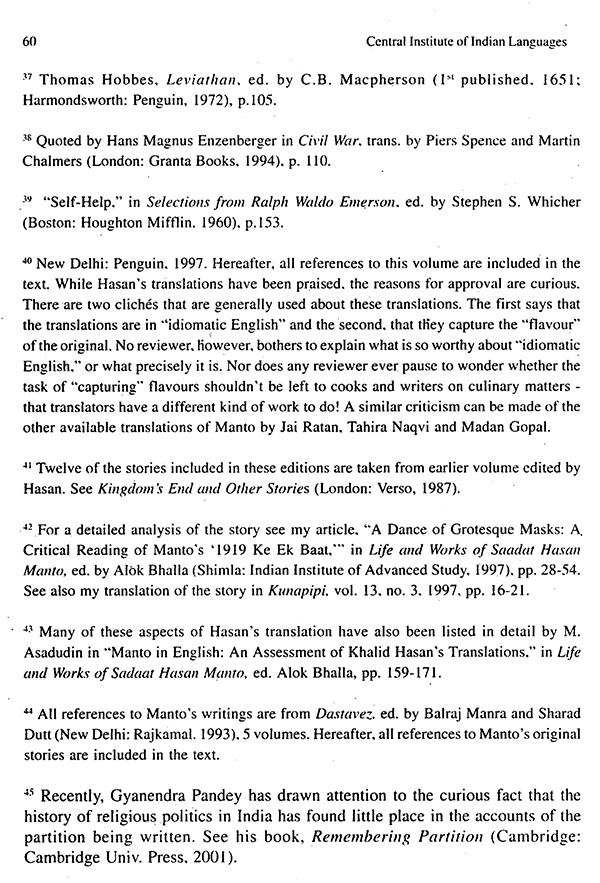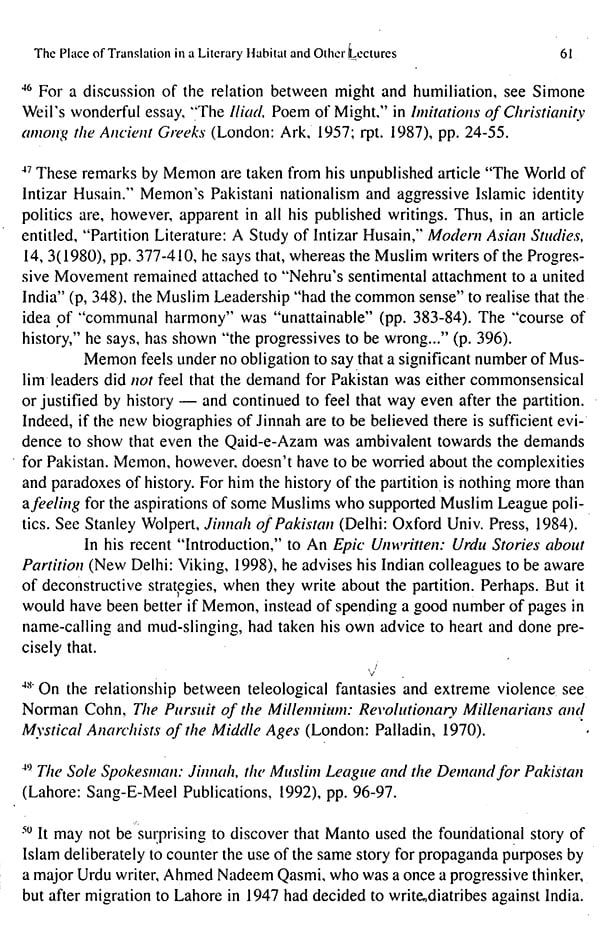
The Places of Translation in A Literary Habitat and Other Lectures
Book Specification
| Item Code: | NAX327 |
| Author: | Alok Bhalla |
| Publisher: | Central Institute Of Indian Languages, Mysore |
| Language: | English |
| Edition: | 2003 |
| ISBN: | 8173421196 |
| Pages: | 64 |
| Cover: | PAPERBACK |
| Other Details | 9.00 X 6.00 inch |
| Weight | 130 gm |
Book Description
Writing situates a text, addresses itself to concerns of the speech community, engages in a dialogue with the readers who share the same time and space, and thus finds a natural ‘habitat’. Translation, on the other hand, is an activity in unsituating the text. It transports the corpse, as it were, to another land, and on the way, keeps its engagement with the text by asking and answering numerous questions, as the translator still looks for ways to get out of the woods. Once the text reaches a Newfoundland, and is made to put on new garbs, it does not look the same. And yet, it must make the same connections as the story unfolds to the new found readers as were made for the original set of readers. That is often a tough job to be undertaken. But, then, one could very well take the easier route and flout all such requirements. After all, the target language readers would not know what they have missed out, if a passage, or an expression or an allusion is dropped in course of this transportation to another habitat.
What Alok Bhalla is trying to tell us here is that while theorists could always find out innumerable strategies and justifications behind any move one makes in course of such renderings, the translator himself must have a code of ethics to follow when attempting to undertake this arduous journey through the difficult terrain. Any one who prides himself as an accomplished translators, to my mind, must remember the Naarada test that the proverbial smart manipulator of saints had had to face. Naarada was confident that he could perform multiple tasks at the same time with equal ease something that any translator must do. To pound on the pride that Naarada exhibited, Lord Vishnu is credited to have asked him to have a cup full of oil in hand, and go around the whole world to see all kinds of people and places, and come back and report to him, without spilling a single drop of oil in the process. It goes without saying that Naarada could neither see the people, nor discover the spaces he traversed through as his fullest concentration was on not letting a drop of oil fall. A translator has to outdo Naarada, by doing so many things at the same time - by looking for lexical equivalences, corresponding syntactic strategies, letting the content be as undistorted as possible, looking for comparable collocations, making the characters and the contexts come alive in a completely different space (and often, at a different time).
On top of this all-out effort in outsmarting Naarada, it is often the case that the translator is often viewed as a ‘parasite’, and an unnecessary evil. Many creative writers sincerely believe that a translator is a pest of a writer that too, often a failed one, waiting for eggs to splash on the face of the source text to smear it beyond recognition, and etching to write on something that he would not have been able to do left to himself. Given this hostility, and the thanklessness that are both parts of his original contract, it is Surprising that in many cases, still, the spirit is indomitable. Of course, we also have the contrast in translators like Fitzgerald who would like to teach an art or two to the original authors. The translation theorists try and find a place for themselves in between these two extremes, and try to propose many explanations for the choices translators have made while trying to get on with their job. What they call strategies are often coincidences or even display of lack of concern and understanding. What they describe as smart moves are often compulsions that are imposed by the target culture or language.
Nevertheless, there are translators who are careful and conscientious and are, therefore, ever ready to create new combinations, collocations and expressions, or make compromises by providing enough warnings (in the form of notes) that the choice made was a poor replacement in the target text. The point that assumes great significance in course of these lectures is the question raised by Professor Bhalla about the place of translation theory in the imaginative and conscientious act of translation, and whether the latter would ever benefit from the wars that are waged in the world of theorists of all kinds. Or, whether translators should be left alone to do things that they know how to do the best.
Serious translation initiates a dialogue across ages, among peoples, amidst confusing cries, and around a set of ideas and ideals. One descends in the maze of lexicon and must find one’s.way out of it. Two words belonging to different space and time, suddenly learn to walk hands in hand. The syllables that harmonize with ore kind of breathing in the heart of the original poet find another pattern to rhyme with in another habitat. Scrambles and extra-positions are out at their best, trying to make all kinds of adjustments in the target language. While all this happens, as theorists, let us wait outside the arena and watch how negotiations are made, what logical pattern emerges from all-out attempts at discovering the deep structure, and how this whole speech act is bound by an unwritten set of ethical rules.
On behalf of the community of writers, translators and theoreticians, and especially on behalf of the CIIL-fraternity, I must thank Professor Alok Bhalla for having graced us by giving these timely warning signals while delivering our Foundation Day Lectures on July 15 through 17", 2003, and in course of doing so, creating a platform of discussion where the Mahabharata and Manto become alive together, breaking the fetters that bind our cultural spaces and try to confine them into histories and mythologies of narrowly defined geo-political entities. The only pity is that a time has now come, after half a century of divide and avoidable bloodshed, when two brothers need to translate each other to make sense out of our spaces and texts that grow out of them.
